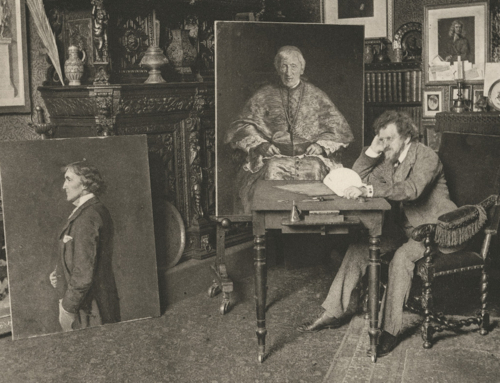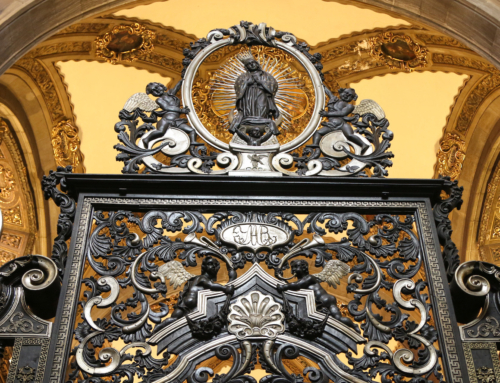Pope Francis is a master of understatement: “He always does a nice job, the Holy Spirit, throughout history.”
In his recent homily for the memorial of St. Athanasius, Pope Francis spoke about the role of the Holy Spirit in fostering harmony in the Church. In the context of the dispute among the early Christians as to whether Gentile converts should be held to the observance of the Jewish law, the Holy Spirit inspired the apostle James, bishop of Jerusalem, to speak in such a way that the dispute was settled (cf. Acts 15:7-21). As the apostles themselves described their consensus, “‘It is the decision of the holy Spirit and of us not to place on you any burden beyond these necessities” (Acts 15:28). As Pope Francis preached, “The Holy Spirit had … to foster harmony among these positions, the harmony of the Church, among them in Jerusalem, and between them and the pagans. He always does a nice job, the Holy Spirit, throughout history. And when we do not let Him work, the divisions in the Church begin, the sects, all of these things … because we are closed to the truth of the Spirit.”
By a happy coincidence, the Vespers reading from the Common of Doctors for the memorial of St. Athanasius also invoked the inspired wisdom of the apostle James: “Wisdom from above is first of all innocent. It is also peaceable, lenient, docile, rich in sympathy and the kindly deeds that are its fruits, impartial and sincere. The harvest of justice is sown in peace for those who cultivate peace” (James 3:17-18). This passage from the letter of St. James, whose author is traditionally identified with the first bishop of Jerusalem, offers us another angle for considering the theme of harmony and division in the Church.
Division and conflict in the Church arise from our sinful passions, not from the spirit of God who is the source of the wisdom from above. As St. Augustine once starkly remarked, even “Christ’s persecutors did not rend His [seamless] garment, [but] Christians divide the Church.” So often in the history of the Church, legitimate theological discussion has given way to bitter controversy that leads to division rather than the unification of the members of the Church in God. In the face of error touching upon the truths of revelation, it is certainly necessary to use theological arguments to identify and correct misunderstandings, but this defense of the faith must exhibit the qualities identified by St. James if it is truly to be “wisdom from above”.
In addition to being innocent (often translated less mellifluously as “pure”), the inspired wisdom that undergirds theological discussion in the Church should be peaceable, lenient, docile, rich in sympathy and the kindly deeds that are its fruits, impartial and sincere. Much could be said about this list of adjectives and its significance for the question at hand, but for now I would like to concentrate of the characteristic of wisdom being peaceable or peace loving (εἰρηνική).
Peace can be a controversial subject at times. It is true that peace can be a hollow good when its assertion does not reflect the full reality of a complex situation through a sort of false irenicism: “They have healed the wound of my people lightly, saying, ‘Peace, peace,’ when there is no peace” (Jer 6:14). Nevertheless, we must never forget that as Christians we are called to preach the gospel of peace: “How beautiful are the feet of them that preach the Gospel of peace, of them preaching good things” (Rom 10:15 [Vg]; cf. Eph 6:15). The Gospel is a Gospel of peace because our God is not the “God of disorder but of peace” (1 Cor 14:33). As St. Paul promises the Corinthians, “Mend your ways, encourage one another, agree with one another, live in peace, and the God of love and peace will be with you” (2 Cor 13:11). By living at peace with one another, a place is prepared for the God of peace to dwell among us.
And yet, the peace that we strive to maintain can only be preserved by the power of God himself. As St. Thomas Aquinas writes in his commentary on Romans, the unity of Christians can only come from the Spirit of Christ.
[St. Paul] touches on the unity of the mystical body when he says we are one body (Rom 12:5): that he might reconcile us both to God in one body through the cross (Eph 2:16). This mystical body has a spiritual unity through which we are united to one another and to God by faith and love: there is one body and one spirit (Eph 4:4). And because the Spirit of unity flows into us from Christ—anyone who does not have the Spirit of Christ does not belong to him (Rom 8:9)—he adds in Christ, who unites us to one another and to God by his Spirit whom he gives us: that they may be one even as we are one (John 18:22).
As Thomas Aquinas writes in his commentary on Hebrews, peace is the proper effect of God, for true peace on earth can only come about from the charity that is given by God alone:
For God’s proper effect is to make peace, because he is not a God of dissension but of peace (1 Cor 14:33), and, have peace: and the God of peace and love shall be with you (2 Cor 13:11). For peace is nothing else than the unity of affections, which God alone can make one, because hearts are united by charity, which is from God alone. For God knows how to gather and unite, because God is love, which is the bond of perfection. Hence, he makes men of one manner to dwell in a house (Ps 68:7). For man made peace between himself and God through the mystery of Christ.
In our common life in the Church, and most of all in our theological investigations and discussions, the God of peace must transform our hearts and minds so that we may truly be lovers of his peace. Let us join our prayer to that of the Church on this feast of Sts. Philip and James: “Purify our minds, we pray, O Lord, by these holy gifts we have received, so that, contemplating you in your Son together with the Apostles Philip and James, we may be worthy to possess eternal life.”
✠
Image: Andrew Wilson Smith, “St. Simon and St. James the Less”, Clear Creek Monastery, Oklahoma.







